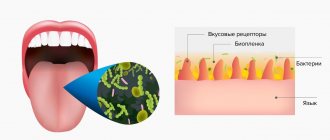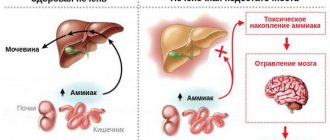Sweet taste in the mouth, causes, symptoms
A sweet taste in the mouth may indicate serious illness.
The human tongue is equipped with special receptors, thanks to which the taste of food and the sensation after it are felt. Why does it taste sweet?
Changes in any department lead to disruption of body functions and distortion of impulses sent to the brain.
They return to the receptor papillae on the tongue and completely change the sense of taste, so that sour and bitter tastes are perceived as sweet after food is eaten.
When absorbing food, the concentration of taste is high and its change is not observed.
Diagnosis of taste disorders in children
If you suspect a taste disorder, you should contact a specialist. Parents should be alerted by the refusal of familiar and favorite foods, and at a more conscious age, by the child’s complaints. Also, the baby may begin to eat things that are not intended for this (it should be noted that at a certain age children “put everything in their mouths” in order to explore the world around them, and this is absolutely normal).
Diagnosing taste disorders in preschool children is quite difficult, since children cannot always clearly describe their sensations. During the examination, the corresponding side of the tongue is moistened alternately with a sweet, sour and bitter solution using pipettes. After each session, rinse your mouth thoroughly. In infants, the doctor pays attention to the general motor and facial reaction. Children over two years old can most often consciously talk about their feelings. Source: E.V. Pavlovskaya Selective appetite in children // Issues of modern pediatrics / 2013/ Volume 12/ No. 6
Causes of sweet taste
A disorder in the digestive system can cause a sweet taste in the mouth.
The reasons for the change in taste in the mouth to a sweet taste are:
- Disorders of the digestive system. Occurs with gastritis and peptic ulcers, when there is an increased level of acidity. From the stomach, part of the processed food is thrown into the esophagus.
- Presence of Pseudomonas aeruginosa. This infection often affects the sinuses, causing congestion, difficulty breathing, and chest pain. Taste sensations are disturbed.
- Smoking. In the tongue receptors, with constant exposure to nicotine, the perception of taste changes.
- Poisoning with chemicals (pesticides).
- Pancreatitis. The development of pancreatitis is indicated by a persistent aftertaste in the morning and an unpleasant burning sensation in the stomach.
- Liver pathology.
- Impaired carbohydrate metabolism, overeating or eating a lot of sweets.
- A state of constant stress and tension. Inflammation of the facial or trigeminal nerve.
- Diabetes mellitus, in which a sweetish taste is formed in the mouth, additional symptoms appear: hunger, thirst.
- Dental problems, diseases of the nasopharynx: pharyngitis, tonsillitis, otitis media, sinusitis, caries, periodontal disease.
- When women become pregnant, functional changes occur throughout the body. Taste priorities also change.
- Respiratory tract infection.
Children's and adult ENT doctor, audiologist, otoneurologist, candidate of medical sciences, Budanov E.G.
Regularly, patients who come for an ENT appointment experience a decrease, disappearance, or distortion of taste sensations, or the appearance of a foreign taste in the mouth. Often these sensations are protracted and lead to changes in taste habits, repeated attempts to self-medicate (gargling, washing the tonsils, constant cleaning of the tongue, etc.) and repeated visits to various specialists: dentists, gastroenterologists, therapists, etc. . Many such visits end with old recommendations being crossed out due to their ineffectiveness and new appointments, which in turn also lead to nothing. To effectively assess and treat taste disturbances, it is necessary to understand the causes of their occurrence. In our body, receptors located in the oral cavity, mainly on the tongue in special taste buds, are responsible for taste sensations. These receptors have different sensitivity to taste stimuli. Some react predominantly to sour, bitter or, say, salty, while others react exclusively to sweet. There are also receptors that respond to a very specific “umami” taste, somewhat similar to the taste of meat dishes. There are also such tastes as burning, or metallic taste, tart taste, etc. Such sensations are not independent individual tastes, but only a generalization of the combination of “standard” tastes with tactile and other sensations on the tongue. Distortion or loss of the ability to distinguish tastes and tastes disrupts the quality of life, the pleasure of eating, appetite, physiological processes of digestion, can cause psychological problems, leads to neuroses and other anxiety states. There is a complete disturbance in the perception of taste, its reduction or distortion. Closely related to a violation of the sense of taste is a violation of the sense of smell, since this leads to a decrease in the “brightness” of the perception of taste and its integral emotional assessment by our consciousness. Often, a decrease in taste perception in such cases is associated with the patient having a runny nose (infections, allergies, occupational hazards, inflammation of the sinuses, etc.) In most cases, such disorders are temporary and disappear as the inflammatory changes in the oral and nasal cavity subside . In such situations, taste disturbance can also be facilitated by the use of medications to treat these diseases: local and general antibiotics, nasal and oral sprays, etc. Persistent loss of taste for more than several weeks - ageusia - can be a sign of a serious illness, so in such cases it is recommended to consult a doctor. This may be due to:
- Metabolic organ dysfunction (hypothyroidism, diabetes mellitus, Cushing's syndrome, etc.)
- Head injuries, including damage to the middle part of the brain (thalamus)
- Brain tumors
- Neoplasms of the oral cavity and tongue
- Chronic dental infections, stomatitis, glossitis
- Sub- and atrophic pharyngitis
- Diseases of the glossopharyngeal and facial nerve
- Upper respiratory tract infections
If, on the contrary, some foreign taste is mixed in when eating food, or all food has a similar “wrong” taste, this may be a signal of serious health problems. For example, a persistent sweetish taste even in unsweetened foods, meat dishes, vegetables, spices, etc. can talk about:
- Possible disruption of insulin metabolism (pre-diabetic or even diabetic stage).
- Acute and chronic intoxication with industrial or household poisons, pesticides, heavy metals, etc.
- Viral infections that damage the taste buds of the tongue, nerves, or the brain's taste processing centers, including coronavirus infection, which is widespread today.
- Psycho-emotional states and mental illnesses (neuroses, stress conditions, depression)
- Infections of the nasal cavity, sinuses, nasopharynx and oral cavity, as well as the lower respiratory tract, caused by Pseudomonas aeruginosa, the waste products of which have a specific unpleasant odor and sweet taste.
- Oncological diseases of the chest organs, primarily lung cancer, as well as larynx and lower parts of the pharynx.
A predominantly sour taste in the mouth can also be associated with viral infections, poisoning, the presence of bacterial infections in the oral cavity (stomatitis, gingivitis, periodontitis) or respiratory tract, as well as:
- In patients with diseases of the esophagus and stomach (diverticula, Barrett's esophagus, esophagitis, gastritis, peptic ulcer of the stomach and esophagus and others), accompanied by reflux of gastric juice through the esophagus into the pharynx.
- In the presence of an infection associated with reflux caused by the microorganism Helicobacter pylori
A salty or clearly salty taste may indicate problems with oral hygiene; it is also observed when drinking alcohol or insufficient fluid intake into the body. Such changes in taste sensations can be easily eliminated if, say, you carry out high-quality oral care, brush your teeth at least 2 times a day, consult a dentist in a timely manner, limit alcohol intake, regulate the daily amount of fluid you drink, etc. The persistence of a salty taste in the mouth while following the above measures may indicate the possible presence of such serious conditions as:
- Inflammation of the salivary glands caused by bacterial infections of the oral cavity and upper respiratory tract, most often streptococci and staphylococci.
- Inflammatory diseases of the sinuses (rhinosinusitis), adenoids in children, etc., which are also associated with bacterial (primarily pneumococci) and, less commonly, fungal infections. The waste products of these microorganisms have a salty taste and impart a similar taste to saliva and mucus that accumulates in the mouth, tongue and pharynx.
Bitterness in the mouth is often associated with taking various medications (antibiotics, choleretic, psychotropic drugs, metronidazole, etc.), physical activity, leading to increased pressure on the abdominal muscles and diaphragm. In serious cases, a bitter taste in the mouth may indicate the presence of:
- Diseases of the gastrointestinal tract, including diseases of the liver, gall bladder and biliary tract, impaired intestinal motility, etc.
- Diseases of the central nervous system, including various types of epilepsy, multiple sclerosis, etc.
- Observed in postmenopausal women
A number of patients experience unusual taste sensations when they eat foods that are familiar to them. For example, vegetables acquire a meaty or fishy taste, fruits acquire a smoked or onion taste, and meat dishes acquire a rotten taste of hydrogen sulfide. There is often a complaint of a metallic taste, a taste of acetone. Similar distortions - dysgeusia (or parageusia) are often found nowadays with coronavirus infection and other viral diseases, and can also be observed with:
- Diseases of the thyroid gland, primarily hypothyroidism with or without autoimmune thyroiditis
- Diseases of the hematopoietic system - iron deficiency, B-12 deficiency anemia.
- Diseases of the gastrointestinal tract, in which the absorption of various microelements and vitamins is impaired.
- Pregnancy
- Mental illness or taking psychotropic drugs
- Poisoning with salts of heavy metals (mercury, lead), arsenic, etc.
In all such cases, competent treatment and prevention of complaints of impaired taste sensations can be prescribed only after a comprehensive assessment of the patient’s health as a whole, and his individual systems in each specific case. For this purpose, the friendly work of doctors of various specialties is required: dentist, ENT doctor, otoneurologist, gastroenterologist, neurologist, psychiatrist, hematologist, endocrinologist, laboratory diagnostic doctors, endoscopists, etc. Self-medication or delay in treatment can lead to serious health consequences, persistent disturbance of taste sensations and complications from those body systems whose functioning has affected the distortion or loss of taste perception.
Metal taste as a symptom of oral diseases
Patients with gum problems often complain of a strong metallic taste that occurs repeatedly throughout the day. The most popular diseases that provoke such unpleasant sensations include periodontitis and gingivitis, which are accompanied by bleeding gums, and many people describe the taste of blood as metallic. It usually appears during brushing your teeth and after eating. Some patients feel as if there is a foreign body in the mouth, which causes serious inconvenience.
Loose teeth and tartar build-up can also cause a metallic taste. There is no point in trying to independently identify the causes - it is better to immediately contact a dentist.
Metallic taste in the mouth of people of different sexes
A number of reasons that cause the sensation of metal are divided by gender.
For men who work in mining or in industries that use heavy metals, an iron taste may appear during each shift and disappear after the end of the shift. Long-term wearing of massive metal objects (bracelets, watches) also leads to a similar result, since during prolonged contact with the skin the concentration of ions entering the blood through the pores becomes too high.
Women may experience a metallic taste due to:
- pregnancy. Many expectant mothers note that a metallic taste periodically appears during pregnancy. Why does this happen? Firstly, the matter may be a lack of microelements and vitamins, and secondly, changes in hormonal levels and malfunctions in the functioning of receptors that recognize taste can be to blame;
- the use of weight loss drugs and various biological additives, which often leads to poisoning due to incorrect dosages and the desire to quickly get the most pronounced result possible;
- insufficient amount of fluid consumed (women resort to this remedy to lose weight and get rid of swelling). A metallic taste is one of the signs of dehydration.
It is best to start combating this not very pleasant feeling by visiting a doctor who will prescribe the necessary tests and examinations. Otherwise, you can look for reasons on your own and continue to experience discomfort regularly for a very long time.
Why there is an iron taste in the mouth: reasons not related to disease
If you notice an iron taste in your mouth, you should not immediately panic: there is a possibility that the unpleasant sensation is not associated with diseases.
It may appear due to:
- drinking mineral water with salts (often this product is enriched to compensate for iron deficiency in the body);
- drinking low quality drinking water (for example, supplied to the home through old rusty pipes);
- tongue piercing (the sensation appears as a result of the metal reacting with certain foods);
- using cast iron and aluminum cookware when preparing and eating food.










